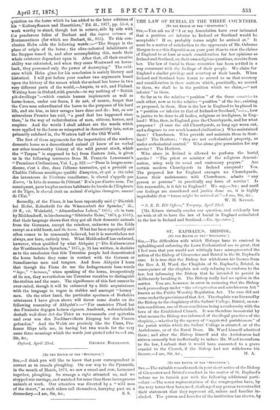THE LAW OF BURIAL IN THE THREE COUNTRIES.
[TO THE EDITOR OF THE "SPECTATOR."] Sin,—You ask me if "1 or my Association have ever intimated that a position not inferior to Ireland or Scotland would be acceptable ? If so, probably terms might be arrived at." It must be a matter of satisfaction to the opponents of Mr. Osborne Morgan to see this disposition on your part thus to view the claims of England to at least as much consideration for her opinions as Ireland and Scotland, on their own religious questions, receive from her. The law of burial in those countries has been settled in a way consonant with the feelings of their people. We claim for England a similar privilege and courtesy at their hands. When Ireland and Scotland have learnt to accord to us that courtesy and consideration in these matters which, practically, we accord to them, we shall be in the position which we claim,—" not inferior" to them.
So far as to the relative " position " of the three countries to each other, now as to the relative " position" of the lair, existing or proposed, in them. How is the law in England to be placed in a " position not inferior to that of Ireland or Scotland,"—i.e., how is justice to be done to all bodies, religious or irreligious, in Eng- land? Who, then, in England gave the Churchyards, and for what purposes ? (I omit the old Churchyards, as long ago worn out, and a disgrace to our much boasted civilisation.) Who maintained them ? Churchmen. Who provide and maintain them in Scot- land? The Heritors ; they are not ecclesiastical property, or under ecclesiastical control." Who alone give permission for any service ? The Heritors.
Who alone in Ireland is allowed to perform the burial service ? "The priest or minister of the religious denomi- .
nation, using only its usual and customary prayers." Are certain modern Churchyards in Ireland excepted ? Yes. The proposed law for England exempts no Churchyards, leaves their maintenance with Churchmen, admits " any person or persons" to practically any form of service ! Is this reasonable, is it fair to Eugland ? We say,—No ; and until our feelings are considered and justice done us, it is highly improbable that "terms might be arrived at."—I am, Sir, &c.,
W. 11. KITSON. " S. R. B. Bill Offices," Torquay, April 23rd.
[N1r. Kitson virtually evades our question, and evidently has no wish at all to have the law of burial in England assimilated to the law in Ireland and Scotland.—En. Spectator.]


































 Previous page
Previous page